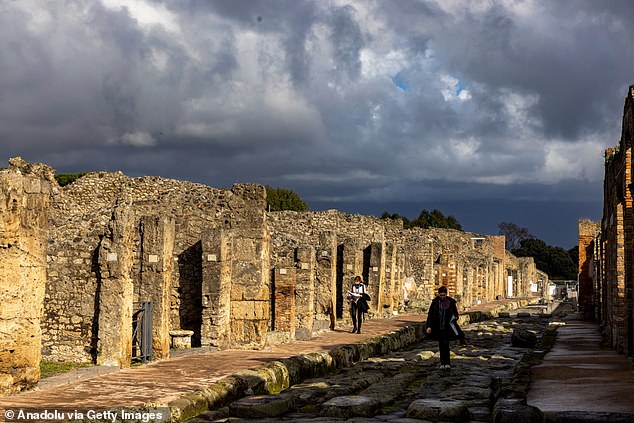I fell victim to the Pompeii ‘curse’: Tourist returns pumice stone stolen from ancient site with grovelling letter written in English revealing she has since been diagnosed with breast cancer
A tourist who stole pumice stones from the ancient city of Pompeii has returned the artefacts along with a fawning letter, claiming the stolen fragments were ‘cursed’.
The woman sent a package containing three small stones and a letter written in English saying she was “unaware of the curse” of Pompeii when she stole the items while on holiday in southern Italy.
The young tourist, who did not give her name, revealed in the handwritten letter that she had been diagnosed with breast cancer within a year of her visit to Pompeii.
‘I didn’t know about the curse. “I didn’t know I wasn’t allowed to take rocks,” the woman wrote. ‘Within a year I was diagnosed with breast cancer. I am a young and healthy woman and the doctors said it was ‘just bad luck.’
“Please accept my apology and these pieces,” the tourist added, before signing off the letter with “I’m sorry” in Italian.
The woman sent a package containing three small stones and a letter written in English saying she was “unaware of the curse” of Pompeii when she stole the items while on holiday in southern Italy.
Pompeii was destroyed after Mount Vesuvius in 79 AD.
Gabriel Zuchtriegel, the director of the Pompeii Archaeological Park, shared a photo of the letter and the returned artifacts on Good luck for your future.’
This isn’t the first time a tourist has returned artifacts stolen from Pompeii, citing a “curse” as the reason.
In 2020, a Canadian woman, identified only as Nicole, sent a package containing two mosaic tiles, parts of an amphora and a piece of ceramics she stole from Pompeii to a travel agency in the Italian city.
Nicole, who stole the artifacts in 2005, said she returned them after they gave her 15 years of bad luck.
She wrote a confession letter detailing her theft and her subsequent misfortunes, including two cases of breast cancer and financial problems.
Nicole wrote: ‘Please take them back, they are bad luck.’
She said she brought the artifacts because she wanted to own a piece of history that no one else had, but that there was “so much negative energy in them… linked to that land of destruction.”

Pompeii was destroyed after Mount Vesuvius in 79 AD. erupted, covering the ancient city with volcanic ash and preserving it until it was rediscovered in the 16th century (file image)
She said at the time: ‘I’m now 36 and have had breast cancer twice. The last time ended in a double mastectomy.
‘My family and I also had financial problems. We are good people and I don’t want to pass this curse on to my family or children.’
Her package also contained a confession letter written by a couple from Canada who stole from the site in 2005.
She said they took the artifacts without thinking of those who suffered there thousands of years ago.
The ancient city is one of the most visited attractions in Italy and has seen many tourists stealing from its ruins.
So many stolen relics have been returned to the site, along with letters expressing guilt, that officials in Pompeii set up a museum to display them.
Gabriel Zuchtriegel said they had received hundreds of apologetic letters from tourists who stole artifacts from the ancient site, many of whom called it a “curse.”
Speaking about the latest case of the woman who returned three pumice stones, he told RaiNews24: ‘We responded to the lady who wrote to us because her letter is very moving, but I remember: stealing goods from archaeological sites is a crime and we must report everything to the authorities.’
He added: ‘Many people write to us about the alleged curse and tell us about the misfortunes they suffered at work or during illness: these are moving and sad things. Many write that they are returning items stolen as children, these are thefts from decades ago.’
Zuchtriegel said “there is no point in taking these items,” before adding: “We are also monitoring the site with video surveillance, but the site is large and it could happen that something is stolen.”
Some thieves have even tried to sell parts of Pompeii online, with a stone from the ruins appearing on eBay in 2015.
